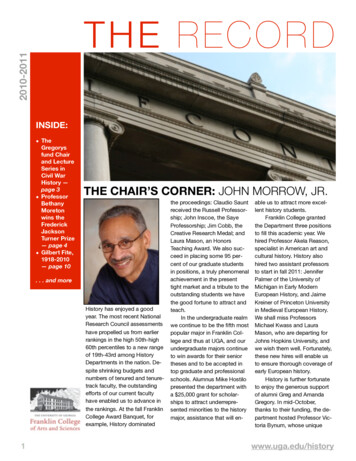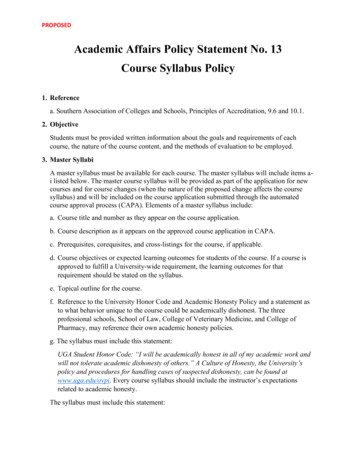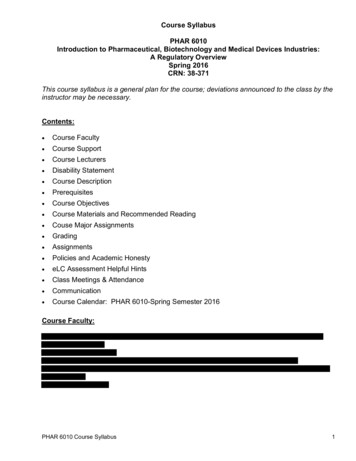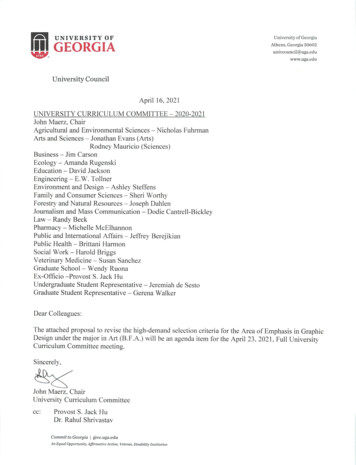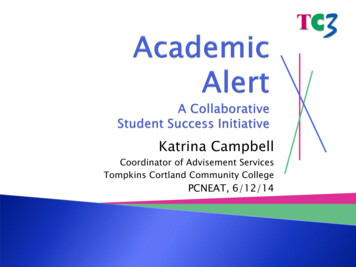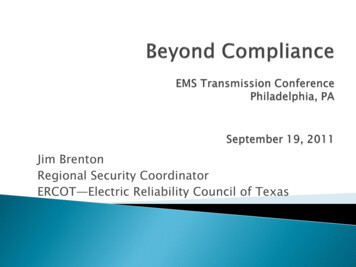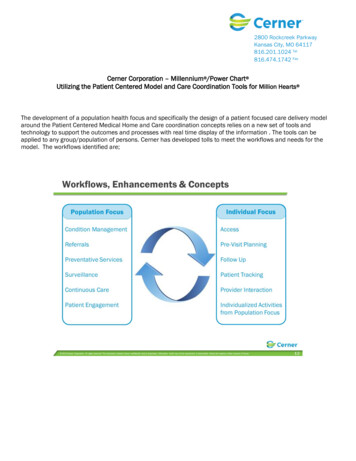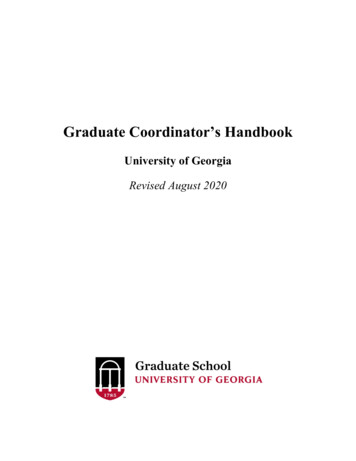
Transcription
Graduate Coordinator’s HandbookUniversity of GeorgiaRevised August 2020
PrefaceThe Graduate School Bulletin is the official source for policies and procedures approvedand established by the Graduate Council. The Graduate Coordinator’s Handbook is a supplementto the Bulletin and is not intended to duplicate material provided in other published documents.Graduate coordinators should refer to the Graduate School Bulletin for complete policies andprocedures.2Graduate Coordinator’s Handbook, revised August 2020
I. Appointment and Role of the Graduate CoordinatorThe dean of the Graduate School appoints the departmental graduate coordinator uponrecommendation and approval by the department head and the academic dean of that unit. Thegraduate coordinator is an appointed member of the Graduate Program Faculty who serves as theliaison between the department and the Graduate School with delegated authority of thedepartment head. It is the responsibility of the graduate coordinator to implement all policies andprocedures of the Graduate Council pertaining to graduate education at the University of Georgia(UGA). Furthermore, the graduate coordinator works in conjunction with the Graduate ProgramFaculty in the department to ensure that policies and procedures unique to the department arefollowed.These are the primary duties of the graduate coordinator: Make recommendations concerning admission to Graduate School. Make recommendations for Graduate School assistantships, dissertation completionawards, scholarships, etc. and assist in rating other applications for these competitions. Maintain current records on all departmental graduate students. Keep graduate students and faculty informed of deadlines, dates, and policies of theGraduate School. Recommend appointment of Advisory Committees for Master of Arts, Master of Science,and doctoral students. Notify the Graduate School of the date, time, and place of Oral Preliminary Exams andFinal Defenses of Doctoral Dissertations. Make recommendations on all petitions submitted by a student in the program to theAppeals Committee of the Graduate Council. Countersign with the major professor on all requests for Degree Objective Changes,Programs of Study, Recommended Changes in Programs of Study, Requests for TransferCredit, and Applications for Admissions to Candidacy.3Graduate Coordinator’s Handbook, revised August 2020
II. Graduate AdmissionsThe Graduate School Admissions Office is responsible for the admission of all graduatestudents at UGA. The initial recommendation concerning the admission of an applicant forgraduate study is made by the academic unit in which the applicant plans to enroll. The finaldecision on admission is made by the dean of the Graduate School. Abbreviated admissionsinformation follows.Applicant for AdmissionApplicants to graduate programs must hold a bachelor’s degree or higher from aninstitution accredited by the appropriate U.S. regional accrediting association. Graduates ofinternational institutions must hold a degree equivalent to a U.S. bachelor’s degree from aninstitution that is recognized by the appropriate government agency in the country. Eachapplicant must file an online application with Graduate Admissions.Entrance Test ScoresEntrance test scores are required for admissions to many degree programs offered at theuniversity. Currently the GRE, GMAT, and MAT are the standardized tests used by mostdepartments at UGA. The Graduate School no longer uses entrance test scores in assistantshipand scholarship competitions and encourages departments to uses holistic admission practices.Departments that choose to use entrance tests can determine the most appropriate of thesestandardized tests or sub-tests to use for admission to their programs with the approval of thedean of the Graduate School. To change the established departmental entrance test requirements,a request must be submitted to and approved by the dean of the Graduate School. Departmentsmay not substitute entrance test requirements for individual applicants. Test score reports mustbe sent directly to Graduate Admissions by the appropriate testing agency. Test scores are validfor five years.A test of English language proficiency (either the TOEFL or the IELTS examination) isrequired of all applicants whose primary language is not English. Applicants who have receiveddegrees from accredited institutions in the U.S. or from institutions in countries where English isthe primary language (e.g., the United Kingdom, Australia, New Zealand) usually are notrequired to submit English language proficiency test scores. If such an applicant received the4Graduate Coordinator’s Handbook, revised August 2020
degree more than two years prior to application to the Graduate School and has beenresiding/working in a country where the primary language is not English, they must submitcurrent scores. Students who are currently enrolled, and have been enrolled at least one year, at aregionally accredited U.S. institution may have the English language proficiency requirementwaived if their work shows a strong quality of performance. Some departments may requireEnglish language proficiency test scores regardless of previous educational experience. TOEFLand IELTS scores are valid for two years from the date of examination.Applicants who have been previously admitted to a degree program and earned credittoward that degree at UGA may submit the same test scores in support of an application for anew degree program. In this case, the scores are not subject to the five-year time limit but mustmeet the standards of the new program. Departments may require new scores.Admission from Baccalaureate to Doctoral ProgramAll program of study requirements specified for doctoral students who hold the master’sdegree must also be met by students who bypass the master’s degree. In addition, the doctoralprogram of study for a student who bypasses the master’s degree will contain at least 20 credithours, exclusive of hours for dissertation research (9000) and dissertation writing (9300), inUGA courses open only to graduate students.Admission to Dual Degree ProgramsCurrent dual-degree program options are listed in the Graduate Bulletin. There are threetypes of dual degree programs: professional /graduate; undergraduate/graduate; andgraduate/graduate. Applicants for dual degree programs must submit the required applicationmaterials and fees for each program.Enrolled graduate students who intend to add a second degree objective should consultwith their major professor/program director before applying to the new program. Students willhave both programs listed in Athena, and clearances for registration will be available from eitheracademic department.5Graduate Coordinator’s Handbook, revised August 2020
Transcripts and Grade Point AveragesDomestic and international applicants must submit one unofficial transcript/academicrecord from each institution attended. See “Country-Specific Academic Credentials andRequirements” on the Graduate School website for information regarding submission ofacademic records for internationals applicants. If admitted to a degree program, students will berequired to submit official transcripts. Official documents must bear an original certificationfrom the appropriate school official or office. Photocopies of certified documents are notacceptable.Transfer credit posted on the records of other institutions, including UGA, is not acceptedin lieu of transcripts from the original institutions. This also applies to study abroad credit that isposted on records as transfer credit to other institutions, if the academic program requires this.The Graduate School will indicate receipt of transcripts in the Slate applicant portal.Grade point averages (GPA) are calculated from the proof of degree transcript.Graduate School Admissions GuidelinesAdmissions guidelines suggested by the Graduate School (GPAs and entrance test scores)are not absolute requirements; rather, they are suggested minimum guidelines. Departments maydetermine on their own admissions criteria. Departments are encouraged to consider applicationsholistically before making admissions decisions. Final decisions for admission are made by thedean of the Graduate School.Departmental Involvement in Record-KeepingInitial applications are received by Graduate Admissions through the online applicationsystem, Slate. A paid application is transferred into Banner. Departments can login to Slate toview application materials.Departmental RecommendationAfter an applicant’s file is complete, the department can review the application materialsin the Reader section of Slate. The department can request reader access for faculty by contactingthe Graduate School. The graduate coordinator or graduate coordinator assistant must submit a6Graduate Coordinator’s Handbook, revised August 2020
recommendation to admit or refuse admission in the Slate Reader. Decisions are not processedthe same day they are submitted.Admissions recommendations must be submitted in a timely manner. Recommendationsshould be made on domestic applications when the file is complete in the Graduate School(unless recommended provisionally – see below). Applicants’ files must be complete for anacceptance or refusal letter to be mailed. Refusal letters will not be mailed after the drop-addpoint of the semester of expected matriculation.Appeal ProcedureIf an applicant is refused admission by an academic department, any appeal on the part ofthe applicant should be directed to the departmental graduate coordinator. The handling of theappeal should follow policies adopted by the department.If an applicant is recommended for admission by a department and is refused admissionby the Graduate School, the appeal should be directed to the office of the associate dean of theGraduate School. The appeal should be made in writing within 30 days after receipt of the noticethat admission has been denied. See Section V of this handbook for the policy governing appealsto the Graduate School.Matriculation Date ChangesAdmission is granted for a specific semester and is validated by registration for thatsemester. Applicants wishing to defer admission to a subsequent semester may submit theirrequest to Graduate Admissions provided the request is received in writing or by email beforethe start of the initial semester of acceptance. A deferred application must be reconsidered by thedepartment, and a new departmental recommendation must be forwarded to GraduateAdmissions. Applicants are allowed only one free request to change their matriculation date. Ifany applicant wants to defer for a second time, the applicant will be required to submit a newapplication and 25 application fee.Provisional AdmissionsAn applicant who is missing requisite test scores, transcripts, or other requirements foradmission, such as letters of recommendation, may be granted provisional admission for one7Graduate Coordinator’s Handbook, revised August 2020
semester. A student who is admitted provisionally and satisfies the requirement within thatsemester, will be admitted as a prospective candidate for a graduate degree. Failure to removethe provisional admission within one semester will result in the student being dropped from thegraduate program, and the student will not be allowed to register for courses.When an applicant is admitted provisionally because of missing test scores, the GraduateSchool will inform the department when the official scores arrive and determine if the test scoresmeet the departmental requirements. Upon confirmation that the test scores meet thedepartmental requirements, the Graduate School will process a degree objective change.General InformationClassification of Graduate Students. Applicants may be considered for admission in oneof the following classifications:1. Prospective candidate. An applicant who has met all requirements and is recommendedfor admission is admitted as a prospective candidate for a graduate degree.2. Provisional. An applicant who is missing an official document or test scores may beadmitted provisionally to a degree program, if recommended by the department andapproved by the dean of the Graduate School.3. Non-degree. An applicant who does not intend to pursue a degree, but wishes to takecourses for professional advancement, licensure, or certification purposes, and who holdsa baccalaureate degree or higher from a regionally accredited institution may be admittedas a non-degree student.4. Graduate transient. A student in good standing at another regionally accredited graduateschool may enroll for one semester at UGA with the submission of the appropriateapplication, fees, and other required documentation. Students admitted in thisclassification who later wish to enroll as prospective candidates for a degree must make aformal application to the Graduate School.Residence Status for the Purpose of paying In-State Tuition. Decisions concerning anapplicant’s classification as a resident or non-resident of the State of Georgia are made based onthe regulations established by the University System of Georgia Board of Regents. To beconsidered a Georgia Resident for tuition purposes, an applicant must first select yes on the8Graduate Coordinator’s Handbook, revised August 2020
application when asked “are you applying for in-state tuition.” Additional questions regardingresidency will appear after selecting yes. A decision on Georgia residence status will be madeafter the application is reviewed. Questions concerning residence status prior to matriculationshould be directed to Graduate Admissions. After matriculation, questions must be directed tothe Office of the Registrar.Name or Address Change. If a person is in the admissions process, a request for a changein name or address must be directed to the Graduate Admissions Office (gradadm@uga.edu).Once a student has enrolled, all requests should be directed to the Office of the Registrar.Admission Classification, Major, or Department Changes. A current applicant maynotify Graduate Admissions of his/her wish to change the proposed degree objective, major,and/or department. These requests should be made by email. Changes must be requested beforethe application deadline passes for the intended semester of enrollment.Applicants requesting changes after the application deadline will be asked to defer theirapplication to a later term. Academic departments may, however, retroactively admit applicantsafter an application deadline. The applicant is responsible for contacting the new departmentregarding any supplemental departmental requirements.Application Materials Provided by the Graduate School. Both domestic andinternational applicants use the same application materials. Admissions policies, forms, anddirections are available in the admissions section of the Graduate School website. Allapplications are submitted online.Assistantship Letters for International Students. Programs must send a copy of thedepartmental assistantship award letter to the Office of Global Engagement. This letter mustinclude a specific statement that the award is an assistantship, the dollar amount of theassistantship, the start and end dates of the assistantship, and the percent appointment/workexpectation of the recipient (e.g., one-third time, etc.). The letter should also state whether tuitionwill be waived or reduced. Visa documents will not be prepared for an applicant who has beenawarded an assistantship until the award letter is received.9Graduate Coordinator’s Handbook, revised August 2020
III. Enrolled Student ServicesEnrolled Student Services maintains graduate student files for registrations, degreeobjective changes, grades, transcripts, test scores, registration flags, and all forms pertaining tocompletion of degree requirements.Graduate Enrollment PolicyGraduate students must register for a minimum of three credit hours during any semesterin which they use UGA facilities and/or staff time. A student who holds an assistantship mustregister for a minimum of 12 hours of graduate credit during the fall and spring semesters andnine hours of graduate credit during the summer semester. Other programs, offices, and agencies,such as the Veterans Administration, Immigration and Naturalization Service, and the Office ofStudent Financial Aid may have other minimum requirements for enrollment.I. Minimum Enrollment. All enrolled students pursuing graduate degrees at UGA mustmaintain continuous enrollment from matriculation until completion of degree requirements.Continuous enrollment is defined as registering for a minimum of three credit hours in at leasttwo semesters per academic year (Fall, Spring, Summer) until the degree is attained or thestudent leaves the program or transitions to non-degree seeking status. The ContinuousEnrollment Policy only outlines minimum enrollment requirements for maintaining status as adegree-seeking graduate student; it does not supersede minimum enrollment requirements forother programs, offices, or agencies.II. Out-of-State tuition waivers. Doctoral students will automatically be granted an outof-state tuition waiver by the Graduate School when they reach candidacy, if they do not have anassistantship-based tuition waiver. The out-of-state tuition waiver will be effective the semesterfollowing the semester in which the student is admitted to candidacy. The student must beadmitted to candidacy prior to the last day of classes. Doctoral students on assistantship at thetime of candidacy must submit the request form if the waiver is needed after the student is nolonger on assistantship.Master’s students who are required to submit a thesis to the Graduate School are eligiblefor the out-of-state tuition waiver after all courses on the program of study have received a grade,with the exception of 7000 (thesis research) and 7300 (thesis writing). A program of study form10Graduate Coordinator’s Handbook, revised August 2020
must be on file in the Graduate School. All students in this category must submit the Applicationfor Waiver of Out-of-State Tuition to the Graduate School by the last day of classes for thesemester prior to the eligible semester. The form is available on GradStatus.III. Leave of Absence. A leave of absence allows students experiencing unusualcircumstances to be temporarily exempt from the Continuous Enrollment Policy. A leave ofabsence requires approval by the department’s graduate coordinator and the dean of the GraduateSchool. A leave of absence will be granted only for good cause such as serious medical andhealth-related issues, major financial and employment issues, pregnancy, childbirth, child care,elder care, other significant family issues, and other personal circumstances that interfere withthe ability to undertake graduate study.An approved leave of absence stands in lieu of registering for the minimum of threecredit hours for each semester for which the leave of absence is granted. During a leave ofabsence, students may not use UGA facilities, resources, or services designed or intended onlyfor enrolled students; receive a graduate assistantship, fellowship, or financial aid from theUniversity; or take any UGA courses related to their program of study. An approved leave ofabsence for any reason other than pregnancy, childbirth, adoption, or military duty does not “stopthe clock”; time on leave counts towards UGA, Graduate School, and academic program timelimits pertaining to the degree being sought. An approved leave of absence for pregnancy,childbirth, adoption of a child under the age of 6, or military duty will not count toward timelimits related to expiration of courses or candidacy governing a student’s graduate degree. Boththe duration of leave and extension(s) of time are subject to the overall time limits of theprevailing Leave of Absence policy. It is not necessary to request a leave of absence for onesemes
Final Defenses of Doctoral Dissertations. Make recommendations on all petitions submitted by a student in the program to the Appeals Committee of the Graduate Council. Countersign with the major professor on all requests for Degree Objective Changes, Programs of Study, Recommended Changes in

